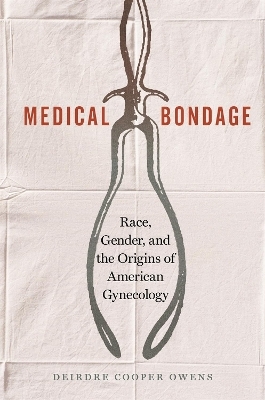
Medical Bondage
Race, Gender, and the Origins of American Gynecology
Seiten
2018
University of Georgia Press (Verlag)
978-0-8203-5475-0 (ISBN)
University of Georgia Press (Verlag)
978-0-8203-5475-0 (ISBN)
Examines a wide range of scientific literature and less formal communications in which gynaecologists disseminated medical fictions about their patients. Even as they were advancing medicine, these doctors were legitimizing groundless theories related to whiteness and blackness, men and women, and the inferiority of other races.
The accomplishments of pioneering doctors such as John Peter Mettauer, James Marion Sims, and Nathan Bozeman are well documented. It is also no secret that these nineteenth-century gynecologists performed experimental caesarean sections, ovariotomies, and obstetric fistulae repairs primarily on poor and powerless women. Medical Bondage breaks new ground by exploring how and why physicians denied these women their full humanity yet valued them as ""medical superbodies"" highly suited for medical experimentation.
In Medical Bondage, Cooper Owens examines a wide range of scientific literature and less formal communications in which gynecologists created and disseminated medical fictions about their patients, such as their belief that black enslaved women could withstand pain better than white ""ladies."" Even as they were advancing medicine, these doctors were legitimizing, for decades to come, groundless theories related to whiteness and blackness, men and women, and the inferiority of other races or nationalities.
Medical Bondage moves between southern plantations and northern urban centers to reveal how nineteenth-century American ideas about race, health, and status influenced doctor-patient relationships in sites of healing like slave cabins, medical colleges, and hospitals. It also retells the story of black enslaved women and of Irish immigrant women from the perspective of these exploited groups and thus restores for us a picture of their lives.
The accomplishments of pioneering doctors such as John Peter Mettauer, James Marion Sims, and Nathan Bozeman are well documented. It is also no secret that these nineteenth-century gynecologists performed experimental caesarean sections, ovariotomies, and obstetric fistulae repairs primarily on poor and powerless women. Medical Bondage breaks new ground by exploring how and why physicians denied these women their full humanity yet valued them as ""medical superbodies"" highly suited for medical experimentation.
In Medical Bondage, Cooper Owens examines a wide range of scientific literature and less formal communications in which gynecologists created and disseminated medical fictions about their patients, such as their belief that black enslaved women could withstand pain better than white ""ladies."" Even as they were advancing medicine, these doctors were legitimizing, for decades to come, groundless theories related to whiteness and blackness, men and women, and the inferiority of other races or nationalities.
Medical Bondage moves between southern plantations and northern urban centers to reveal how nineteenth-century American ideas about race, health, and status influenced doctor-patient relationships in sites of healing like slave cabins, medical colleges, and hospitals. It also retells the story of black enslaved women and of Irish immigrant women from the perspective of these exploited groups and thus restores for us a picture of their lives.
Deirdre Cooper Owens is an assistant professor of history at Queens College, CUNY. She has received numerous awards and fellowships, including a residential postdoctoral fellowship at the Carter G. Woodson Institute for African American and African Studies at the University of Virginia and an American College of Obstetricians and Gynecologists Fellowship.
| Erscheinungsdatum | 26.07.2018 |
|---|---|
| Zusatzinfo | 10 black & white images |
| Verlagsort | Georgia |
| Sprache | englisch |
| Maße | 152 x 229 mm |
| Gewicht | 270 g |
| Themenwelt | Geisteswissenschaften ► Geschichte |
| Studium ► Querschnittsbereiche ► Geschichte / Ethik der Medizin | |
| Sozialwissenschaften ► Soziologie ► Makrosoziologie | |
| Sozialwissenschaften ► Soziologie ► Spezielle Soziologien | |
| ISBN-10 | 0-8203-5475-9 / 0820354759 |
| ISBN-13 | 978-0-8203-5475-0 / 9780820354750 |
| Zustand | Neuware |
| Informationen gemäß Produktsicherheitsverordnung (GPSR) | |
| Haben Sie eine Frage zum Produkt? |
Mehr entdecken
aus dem Bereich
aus dem Bereich
Die Geschichte eines Weltzentrums der Medizin von 1710 bis zur …
Buch | Softcover (2021)
Lehmanns Media (Verlag)
17,95 €
von der Antike bis zur Gegenwart
Buch | Softcover (2024)
C.H.Beck (Verlag)
12,00 €
Krankheitslehren, Irrwege, Behandlungsformen
Buch | Softcover (2024)
C.H.Beck (Verlag)
39,95 €


